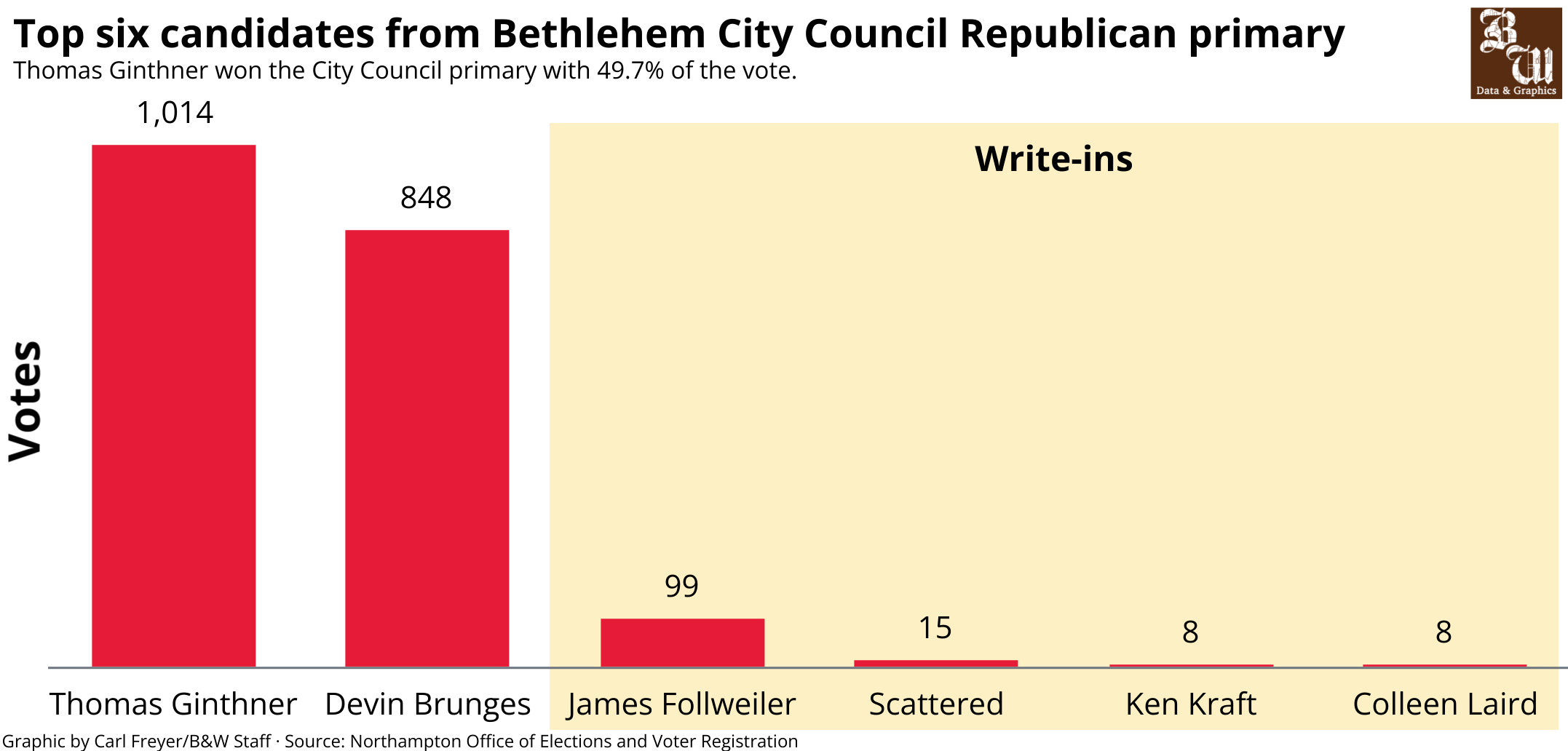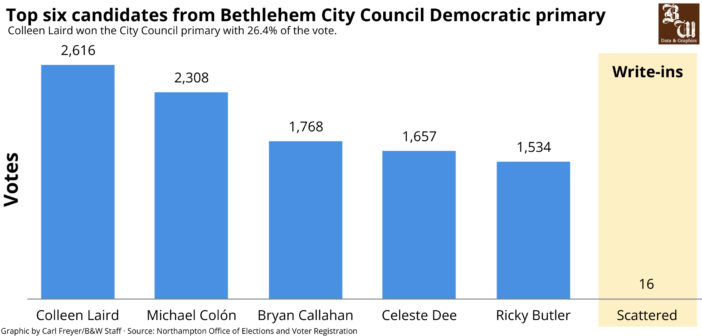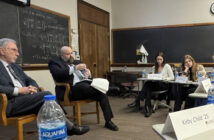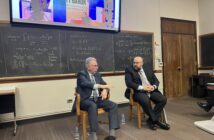Bethlehem residents will vote Nov. 7 to fill three City Council seats. The race features three Republicans and three Democrats.
The Democratic candidates running for office are Colleen Laird, Micheal Colón and Bryan Callahan, and the Republican candidates are Thomas Ginther, Devin Brunges and Jim Follweiler.
Micheal Colón is the only incumbent, as two previous members of the council, Wandalyn Enix and Paige Van Wirt, are not seeking reelection.
The last time the Bethlehem City Council race consisted of any Republicans was in 2013.
Jack Willard, ‘24, the vice president of the Lehigh College Republicans, said he thinks the Republicans are running on more viable campaigns this time because there are Independents who are not satisfied with how the City Council has behaved.
“The council is not just a body of people we’ve elected to unilaterally make decisions,” Willard said. “It’s a body of people meant to represent the interests of the community as a whole, and if they’re not doing that, then the people that comprise the council should be replaced.”
Sam Denison, ‘24, the vice president of the Lehigh Democrats, said the Republicans are running a more moderate race and focusing on hyperlocal issues — despite what their stance may be on national ones — because they are aware the last time a Republican held a Bethlehem City Council seat was in 1998. But, he said the Republicans lack plans.
“You can clearly see where the Democratic candidates stand, and when they get to City Council, what issues they’re going to fix because that’s what they’re talking about right now,” Denison said.
Here are the top six candidates:
Colleen Laird (D)
In the primaries on May 16, Laird received the most votes, at 2,616 votes.
She grew up in Bethlehem, graduating from Moravian College in 2008, and was previously on the board for the Bethlehem Food Co-Op and Northside Alive plan. She is currently the assistant chief information officer for strategy and communications at Moravian University.
In 2020, South Side Bethlehem was declared a “food desert” by the United States Department of Agriculture. Laird said she understands the government is not responsible for opening grocery stores, but she thinks there should be efforts to help people get access to healthy food.
Laird thinks the city could continue to provide funding to nonprofit organizations that can do this work, such as the Bethlehem Food Co-Op, which was able to open a store with help from the City Council and federal grants.
To make food access more attainable, Laird also thinks the city government should work to improve walkability and public transportation in Bethlehem, especially for people with disabilities who may not be able to carry their own grocery bags.
On the issue of homelessness, Laird said the Bethlehem City Council should partner with existing nonprofit organizations to help identify a site for a homeless shelter and support its development.
Laird also recognizes climate change will impact marginalized communities first. She said this is why she was a part of Bethlehem’s Environmental Justice and Equity Implementation Committee.
The Lehigh River is one of the most polluted waterways in the United States, Laird said, and she thinks the council should look at limiting impervious surfaces or start incentivizing green space creation to help with runoff into the river.
Laird also thinks the city could look at zoning to help prevent polluted runoff by supporting vegetation belts and riparian buffer zones — a conserved area connected to a stream, lake, or wetland that contains a combination of trees, shrubs, and other perennial plants.
“Bethlehem is at a pivotal point where we’re growing,” Laird said. “And growth is good, but we have to be responsible in planning and balancing respect for the existing community with plans for the future.”
Michael Colón (D)
Colón received the second-most votes in the primaries, with 2,308 votes.
He grew up in Bethlehem and has a political science degree from Penn State University. He now sits on the board of the Hispanic Chamber of Commerce for the Lehigh Valley, is a trustee for the foundation of the Bethlehem Area School District and works as an admissions manager for Gracedale Nursing Home.
As the previous council president for seven years, Colón thinks affordable housing is one of the most pressing issues in Bethlehem. He said people’s incomes have not risen at the same rate as housing costs in the last few years, leading the city to create a five-year plan with initiatives designed to create more affordable housing. Like Laird, Colón thinks Bethlehem should work with New Bethany to create a permanent homeless shelter.
Regarding environmental issues, Colón thinks the city should be more sustainable in how they design and build things, how buildings are heated and how facilities are managed. However, he understands there is always a trade-off with cost.
Colón said one sustainable solution is to transition some traffic enforcement vehicles from gasoline to electric.
Unlike in federal elections, Colón said candidates cannot focus on large, abstract concepts. Instead, the race focuses on issues like why the city wants to zone something a certain way.
“It’s not just about trying to make things into ideological battles, but it’s more the practical nature of the work that we do,” Colón said.
Bryan Callahan (D)
Callahan received 1,768 votes in the primaries, placing him third in the race.
He was raised in West Bethlehem and received a bachelor’s degree in journalism from Lock Haven University, a teaching certification from East Stroudsburg University and a master’s in education from Wilkes University.
Callahan is a retired Bethlehem Area School District teacher who opened a driving school and testing center in 2011 and previously served on the council from 2014 until he resigned in 2021.
According to his website, he wants to continue to pursue responsible and sustainable development that will bring more jobs into Bethlehem, such as revitalizing the former Bethlehem Steel site.
He said to do so, the city should “hold the line” on taxes.
Callahan said he wants to focus on ensuring good basic services that will sustain a high quality of life for Bethlehem residents.

Thomas Ginthner (R)
Ginthner received 1,014 votes in the primaries, putting him in fourth place overall and making him the most popular Republican candidate.
He is a long-time resident of Bethlehem and has worked in sales, marketing and consulting.
Ginthner wrote, in an email to The Brown and White, the city needs to focus more on “needs,” like fixing roads and having better coordination between water, street and other public utilities.
He wrote the city also needs to focus on services like the police and fire departments and emergency medical services.
Aligning with Laird, he wrote that the Lehigh River is polluted, and he added that the City Council should be doing more to mitigate the run-off from the Bethlehem landfill into it.
Ginthner wrote affordable housing is an important issue, referencing a Harvard study but thinks the way City Council is currently going about it is ineffective.
He wrote the council approving apartment buildings with rents above $800 does nothing to help with the issue. Rather, he thinks the city of Bethlehem should create Affordable Housing Trusts that pool public and private funds to work for economic, social and racial justice.
He believes, like Brunges and Follweiler, there should be more transparency and open discussion with the public in City Council meetings, and there should be internal audits to track the expenditure and revenue of the council.
Ginthner said focusing on these issues is part of his plan to “merge” left and right political issues, and he thinks a Republican on Bethlehem City Council would diversify the thoughts currently present there.
Devin Brunges (R)
Brunges received 848 votes in the primaries, placing him fifth overall.
He received a bachelor’s degree from Mansfield University of Pennsylvania in communication and media studies in addition to a master’s of business administration and marketing from the University of Phoenix.
Brunges is a retired U.S. Army Major from Florida who moved to Bethlehem in 2017 and has worked in public affairs and as a journalist.
He thinks the government should establish direct contact with taxpayers and incorporate increased technology into City Council and special committee meetings so they are always accessible to the public. This is part of his campaign, which pushes for more transparency in city government.
Brunges said homelessness in Bethlehem is not the city’s most important issue.
“We have a number of nonprofit organizations designed specifically to handle those things,” Brunges said. “Those things are important, but they’re not our responsibility. Now people will throw tomatoes at me for saying that because of that little ‘R’ behind my name. That little ‘R’ says the government is not responsible for fixing every little problem.”
Brunges said taking care of our environment, and by extension, our future community, is more important.
Concerning new developments, Brunges said the council should be stricter about meeting green considerations on building codes — which includes energy consumption reduction and the use of energy-efficient lighting.
Brunges said there should be more green spaces to compensate for carbon emissions, and the Martin Towers space should be retained by the public and turned into a green space.
He echoes Ginthner, saying the city must take better care of its parks, streets, and public service areas like the police department, fire department, and emergency medical services.
Training and manpower are currently lacking, he said, and if these areas continue to be neglected, it could affect citizen’s safety.
“If it was 30 years ago, people would say I was a moderate Democrat,” Brunges said. “But the spectrum definitions have changed so much. The common-sense guy (is) in the middle, and in this day and age of hyperventilation and cancel culture, I’m offering a very simple change of common sense.”
Jim Follweiler (R)
Follweiler received the sixth-most votes in the primaries with 99 write-in votes.
He received a bachelor’s of science in business administration and finance from Susquehanna University, a master’s of arts in history from Lehigh University, and a master’s of business administration in aviation from the Embry-Riddle Aeronautical University.
He is a Bethlehem native, was a Colonel in the U.S. Army Reserve, and served as a response and logistics official for the Federal Emergency Management Agency.
Follweiler thinks the average citizen of Bethlehem’s top priority doesn’t align with the current elected officials’ priorities of affordable housing and homelessness.
“These are Mayor Reynold’s top priorities,” Follweiler said. “The majority of the City Council believes it’s their top priority because it’s the mayor’s top priority.”
He said the city should not get directly involved, because it would be inefficient and the issue would become political. Rather, he thinks, the city should allow nonprofits like New Bethany, which runs the emergency homeless shelter, to organize efforts to create a shelter.
The current program where developers have to set aside 10% of the units for affordable housing does not work, he said. To him, this is because developers are supposed to lower the rent per the agreement, but if the unit was originally $2000, the average person still cannot afford it.
Follweiler said the city should instead focus on creating better jobs with better incomes and a better economy by ensuring people are in school, whether they track for college or vocational training.
“It’s been 25 years since one Republican has been on the City Council,” Follweiler said, “It creates an environment, and it would be the same if it were the other way too, of complacency that limits and reduces true public discourse and debate on issues.”
He points specifically to the approval of the demolition of the Walnut Street Garage as an example of this, especially because the city only came up with one plan for the garage’s replacement.
Follweiler said he believes in the importance of historical preservation and disagrees with the council’s approval of the demolition.
He said money should first go to core functions, like public services and infrastructure, and that if there is money left over it can be spent on these “pet projects.”
“The priority and the emphasis should be put on the roads, the parks, the police, the fire (department), whose status isn’t even discussed anymore,” Follweiler said, “Everything is overall in a state of decline.”






Comment policy
Comments posted to The Brown and White website are reviewed by a moderator before being approved. Incendiary speech or harassing language, including comments targeted at individuals, may be deemed unacceptable and not published. Spam and other soliciting will also be declined.
The Brown and White also reserves the right to not publish entirely anonymous comments.